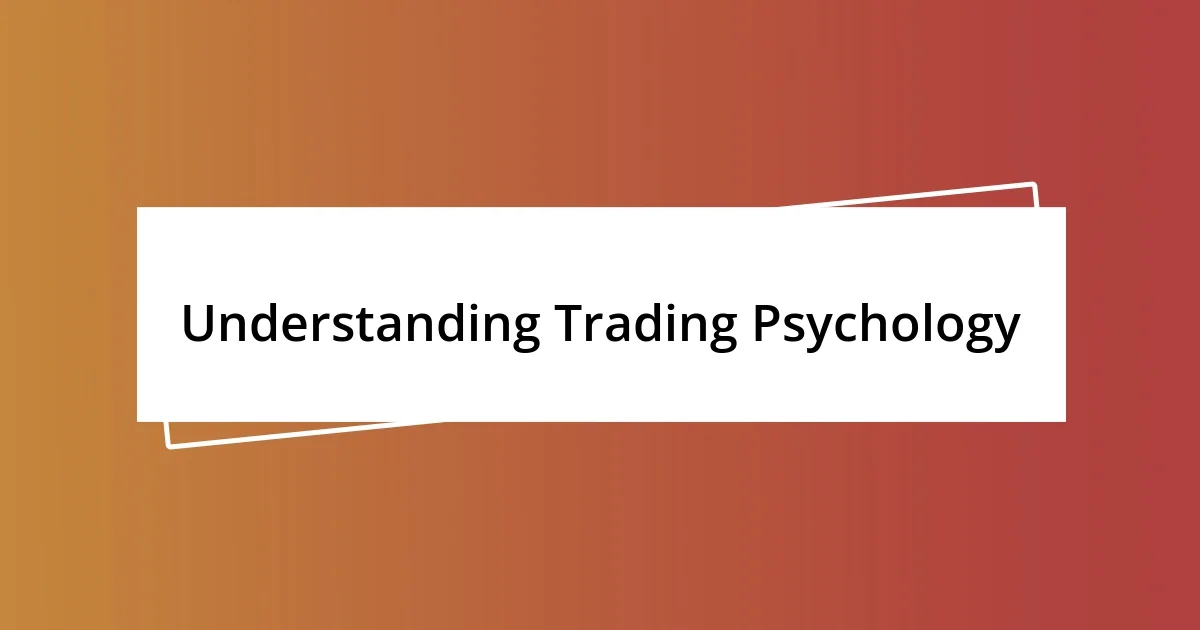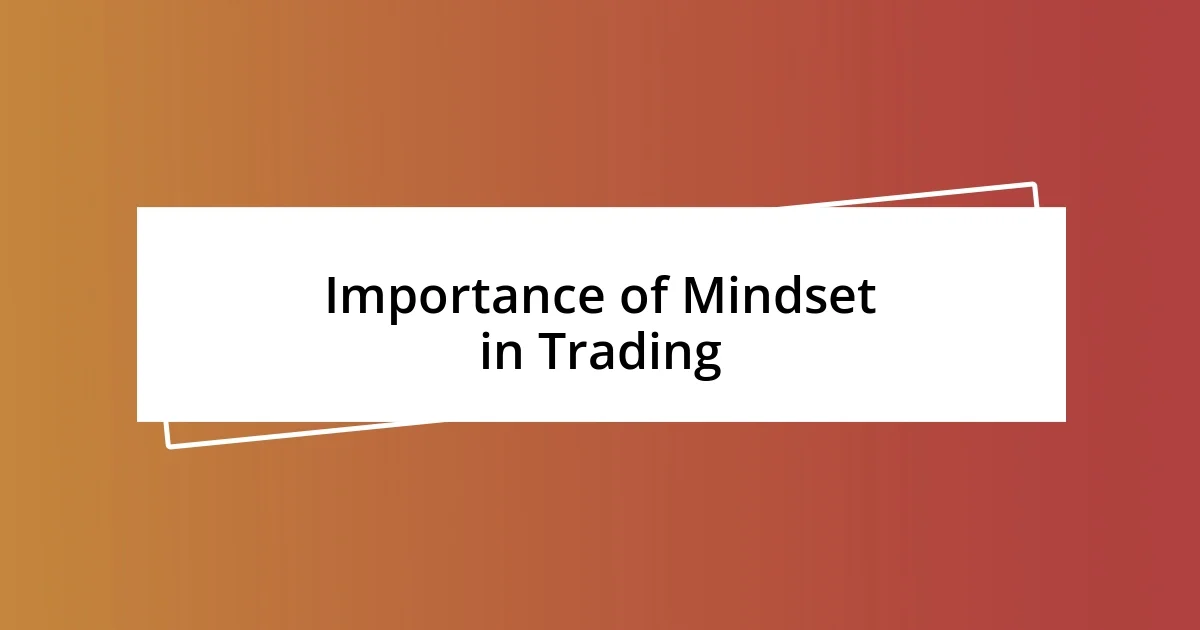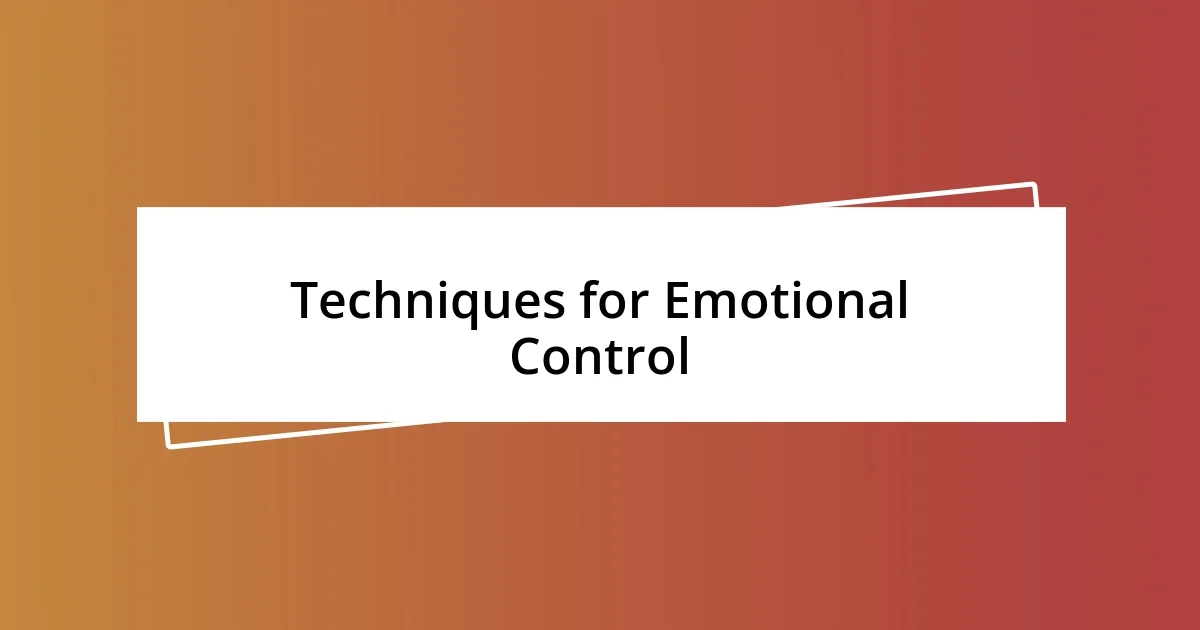Key takeaways:
- Trading psychology significantly influences decision-making and outcomes; emotional states like fear and overconfidence can lead to impulsive actions.
- Common psychological traps, including the illusion of control, loss aversion, and confirmation bias, can hinder a trader’s success and rationality.
- Establishing a structured trading plan with clear goals and regular performance evaluations is essential for maintaining discipline and consistency in trading.

Understanding Trading Psychology
Trading psychology is a fascinating and often underestimated aspect of the trading world. I once found myself in a situation where my emotions clouded my judgment during a critical trade. Have you ever felt that rush of excitement or anxiety right before making a decision? That rush can lead to impulsive choices or, conversely, a paralyzing fear that stops us from taking action.
It often amazes me how much our mindset can influence our trading outcomes. During one particularly volatile market moment, I remember feeling a sense of panic when my strategy didn’t seem to align with the market movements. I realized that my emotional state was hindering my ability to think clearly. Have you noticed how stress can twist your perspective, causing you to deviate from your plan?
Understanding trading psychology isn’t just about managing fear and greed; it’s about recognizing patterns in our behaviors. When I took a step back to analyze my trades, I discovered recurring themes of overconfidence after wins and discouragement after losses. It made me wonder—how regularly do we check in with our mental state? By being aware of these mental shifts, we can develop a more disciplined approach to our trading, leading to consistent results.

Importance of Mindset in Trading
Mindset plays a pivotal role in trading, shaping our decisions and ultimately impacting our success. I’ve found that even the most well-researched strategies can falter if my mindset isn’t aligned. Once, during a string of losses, I started to second-guess my analysis, which only compounded my stress. It’s remarkable how a shaky mindset can create a snowball effect, distorting not just our current decisions but our entire trading approach.
Here are a few key aspects that highlight the importance of mindset in trading:
- Emotional Control: Maintaining composure allows for more rational decisions, even when the market is volatile.
- Self-Discipline: A strong mindset helps stick to trading plans, reducing impulsive actions driven by fear or excitement.
- Resilience: A positive outlook enables traders to bounce back after losses, viewing them as learning opportunities rather than failures.
- Adaptability: A flexible mindset allows for quick adjustments when market conditions change, which is crucial in a dynamic environment.
I’ve learned that nudging my thoughts from negativity to a more constructive perspective can significantly shift my results. The mind truly is a trader’s best ally—or worst enemy, depending on how we choose to manage it.

Common Psychological Traps Traders Face
Common psychological traps can significantly impede a trader’s success. One common trap I fell into was the illusion of control. I remember a specific instance where I was convinced that certain market patterns were predictable, but I was ultimately blindsided by unexpected volatility. This overestimation of my predictive abilities led to reckless decisions. It’s essential to recognize that the market is unpredictable, and no matter how much analysis we conduct, we can’t control every outcome.
Another psychological pitfall is the phenomenon of loss aversion. I recall a time when I faced a small loss, and instead of cutting my losses, I clung to the position, hoping it would bounce back. My emotional attachment to that trade prevented me from making rational decisions. Loss aversion often leads traders to avoid taking necessary risks or closing losing positions, thinking they’ll somehow recover. This emotional response can be detrimental to long-term success.
Lastly, confirmation bias can be particularly insidious. I’ve been in situations where I was so focused on evidence supporting my initial thesis that I ignored contradictory signs. One trade spiraled out of control because I refused to acknowledge the shifting market conditions. This tendency to favor information that confirms our beliefs creates a blind spot that can have serious repercussions. It’s a reminder for me that staying open-minded and reevaluating my positions regularly is crucial in navigating the trading landscape.
| Psychological Trap | Description |
|---|---|
| Illusion of Control | Overestimating one’s ability to predict market movements can lead to reckless trading decisions. |
| Loss Aversion | A tendency to hold on to losing trades in hopes of recovery, often leading to increased losses. |
| Confirmation Bias | Favoring information that supports preexisting beliefs, resulting in missed opportunities or potential losses. |

Techniques for Emotional Control
Developing emotional control is crucial in trading, and I’ve found a few techniques that really work for me. One effective method is practicing mindfulness. I often take a few moments before executing a trade to center myself—focusing on my breath and visualizing my trading strategy. This small ritual calms my mind and helps me approach my decisions with clarity. Have you ever noticed how a moment of pause can change your perspective?
Another technique I cherish is maintaining a trading journal. I jot down my thoughts and emotions throughout the trading day. Reflecting on what I felt during certain trades often reveals patterns in my behavior that I hadn’t noticed before. I remember one entry where I acknowledged feeling overly eager after a series of wins. Being aware of that rush helped me temper my enthusiasm in future trades, making me less impulsive and more strategic. How do you hold yourself accountable emotionally?
Lastly, I’ve incorporated regular breaks into my trading routine. Stepping away from the screen gives me the space to decompress and re-evaluate my approach. I vividly recall a day when I was glued to my monitor, riding the emotional highs and lows of the market. After a short walk, I returned with a clearer mind and a more balanced perspective. It’s amazing how a little fresh air can make such a difference. Doesn’t that sound like a simple yet effective trick worth trying?

Developing a Trading Plan
Crafting a trading plan is like building a roadmap for your trading journey. I’ve learned that a well-structured plan helps prevent emotional decision-making, which can be detrimental in the heat of the moment. I recall a time when I entered trades based on gut feelings rather than a solid strategy, and the results were less than favorable. Wouldn’t it have been better if I had a clear plan to guide my actions?
A fundamental component of my trading plan is setting specific entry and exit points. I remember one particular trade where I ignored my predefined exit strategy and ended up holding when I should have cut my losses. That experience taught me the value of sticking to my plan—no matter how tempting it might be to deviate based on fleeting sentiments. It’s almost like setting a destination on a map; without it, you risk getting lost in the chaos of the market.
Risk management is another crucial aspect I prioritized in my trading plan. Initially, I approached each trade with a reckless sense of adventure, often risking too much capital. The fear of losing my hard-earned money was overwhelming. After a few painful experiences, I decided to limit my risk to a fixed percentage of my trading capital for each trade. This shift transformed my approach, allowing me to trade with confidence and clarity. Have you defined your risk tolerance yet? It’s a game changer.

Building Discipline and Consistency
Building discipline and consistency in trading is a journey that often requires a personal commitment to a structured routine. In my experience, I found that dedicating specific times for trading helped me create a rhythm that fosters reliability. I remember the early days when I would trade whenever I felt like it. This erratic approach led to chaos and inconsistency in my results. Now, I ritualize my trading hours, and that disciplined schedule keeps me accountable and sharply focused.
Another essential aspect I’ve embraced is the practice of setting daily goals. I’ve started each day by identifying one or two key objectives—like evaluating a certain number of stocks or practicing a specific strategy. This simple exercise has honed my consistency. In fact, during a particularly challenging week, I was feeling overwhelmed. However, by sticking to my daily goals, I found that even modest achievements helped maintain my motivation. Isn’t it incredible how small wins can pile up to create a sense of accomplishment?
Lastly, I can’t stress enough the impact of self-reflection in building discipline. After each trading session, I spend some time reviewing what went well and where I fell short. I recall a moment when I realized I was repeating mistakes because I wasn’t taking the time to reflect on my actions. This newfound practice transformed my approach, making me more mindful about my decisions. Have you carved out time for reflection? It’s a powerful tool that cultivates both discipline and consistency.

Evaluating and Reflecting on Performance
Evaluating my trading performance has been a pivotal learning experience for me. I remember sitting down after a particularly turbulent week, feeling frustrated by the losses I endured. As I reviewed my trades, I realized that many of my mistakes stemmed from impulsivity rather than rational analysis. Reflecting on those moments not only helped me identify patterns in my behavior but also allowed me to grasp the significance of emotional control in trading.
I often find myself revisiting my trades in a journal I maintain, analyzing each decision like a case study. One day, I stumbled upon a trade where I let fear dictate my exit point, and that taught me how critical it is to differentiate between logical choices and emotional responses. I can’t help but ask, have you considered this level of introspection in your own trading journey? Embracing this practice has allowed me to build a more objective perspective on my performance and refine my strategies accordingly.
As I continue to reflect on my trading experiences, I recognize the importance of seeking external feedback. I remember attending a trading group session where peers critiqued one another’s strategies. It was somewhat daunting at first, but their insights were incredibly valuable. Having someone else point out blind spots I overlooked was a game changer. I encourage you to connect with fellow traders for constructive feedback. Isn’t it amazing how collaboration can enhance our individual growth?













